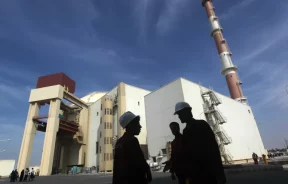Russian Embassy in Tehran Criticized Western Anti-Iran Actions at IAEA Board of Governors
WANA (Nov 24) – The Russian Embassy in Tehran has issued a statement criticizing the United States, the United Kingdom, Germany, and France for what it described as provocative and anti-Iran actions during the recent International Atomic Energy Agency (IAEA) Board of Governors meeting.
On November 21, the IAEA Board discussed a draft resolution related to Iran’s safeguards. This draft was initiated by the US, UK, Germany, and France—countries that have long sought to escalate tensions over Iran’s nuclear program both globally and within the IAEA.
The statement highlighted that these efforts are clearly aimed at portraying Tehran as a primary threat in the Middle East and diverting international attention away from the Gaza crisis.
The statement also pointed out that several of the co-authors of the resolution are the same countries that have consistently violated UN Security Council Resolution 2231, failed to uphold their commitments under the Iran nuclear deal (JCPOA), and disrupted multilateral efforts to revive the agreement.

Adoption of a Resolution by the IAEA Board of Governors Against Iran’s Peaceful Nuclear Program
WANA (Nov 22) – The Board of Governors of the International Atomic Energy Agency (IAEA), based on non-technical and politically motivated claims, passed its anti-Iran resolution with a slim majority. The resolution, adopted by the IAEA Board of Governors, calls on Tehran to take urgent and necessary actions to address alleged safeguards issues, despite […]
Russia suggests that these countries hope the international community will forget the factors that led to the stagnation of this important agreement. European JCPOA signatories, in close cooperation with Washington, have been working to “damage Tehran’s image” and place full blame on Iran.
The statement made clear that had the JCPOA been maintained, doubts about Iran’s nuclear program would have been automatically addressed. However, it seems that some in the West, who benefit politically from the tensions surrounding Iran, are continuing to repeat baseless threats over Iran’s peaceful nuclear activities.
Russia views the resolution as a misstep, noting that its real objectives differ significantly from non-proliferation aims. Despite the resolution being adopted by a majority of the IAEA Board members, only 19 out of 35 countries voted in favor, while others—representing a majority of the global community—either abstained or voted against it.
The Russian government firmly rejected the resolution, considering it inappropriate and ineffective in fostering constructive engagement between Iran and the IAEA. The statement emphasized that this action, led by Anglo-Saxon and European powers, was designed to undermine such engagement.
The fact that the draft was distributed among the IAEA Board members before the related agency reports were published, and coincided with IAEA Director-General Rafael Grossi’s visit to Tehran and his meetings with Iranian officials, further attests to this intent.

Iran’s Response to the IAEA Resolution: Deployment of a Significant Set of New Advanced Centrifuges
WANA (Nov 22) – The head of the Atomic Energy Organization of Iran (AEOI), in response to the anti-Iranian resolution passed by the IAEA Board of Governors, issued orders for effective measures, including the deployment of a significant set of new and advanced centrifuges of various types. A joint statement by Iran’s Ministry of […]
Russia expressed that the prospect of strengthening cooperation between Tehran and the IAEA is unappealing to the West, as it contradicts their agenda. The West appears ready to take any action to justify its “maximum pressure” policy against Iran, which began after the US’s withdrawal from the nuclear deal in 2018. This destructive approach has long lost its credibility and only contributes to increasing conflicts and tensions.
The Russian side hopes that the IAEA’s leadership will understand the situation and not allow countries acting on political motives and driven by Iranophobia to dominate the Agency.
Notably, during Grossi’s visit to Iran, he emphasized the continuation of constructive engagement with Tehran. Moscow hopes he will maintain this course and disregard biased resolutions that lack legal validity.













User comments